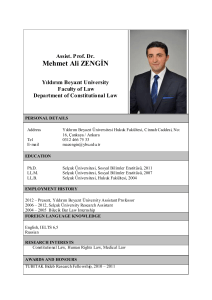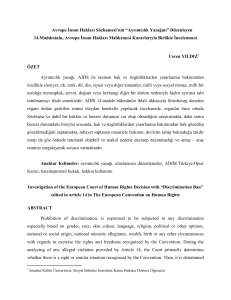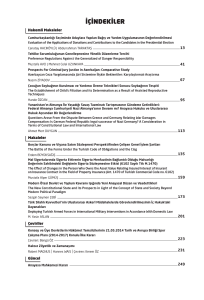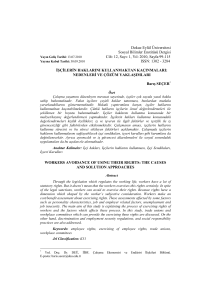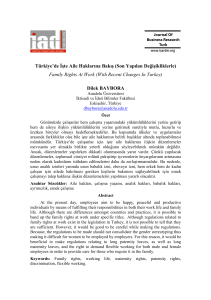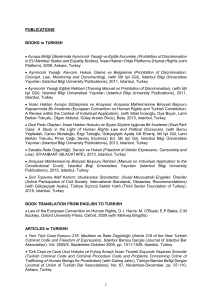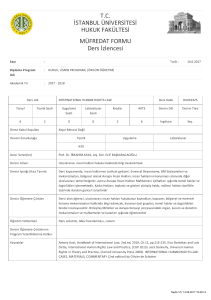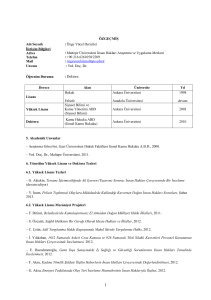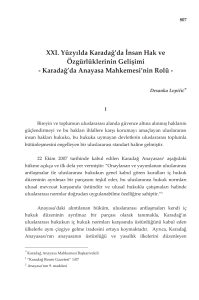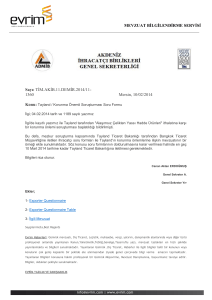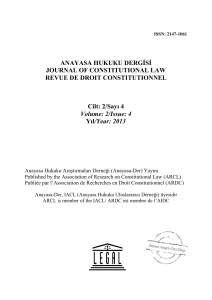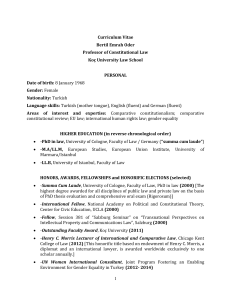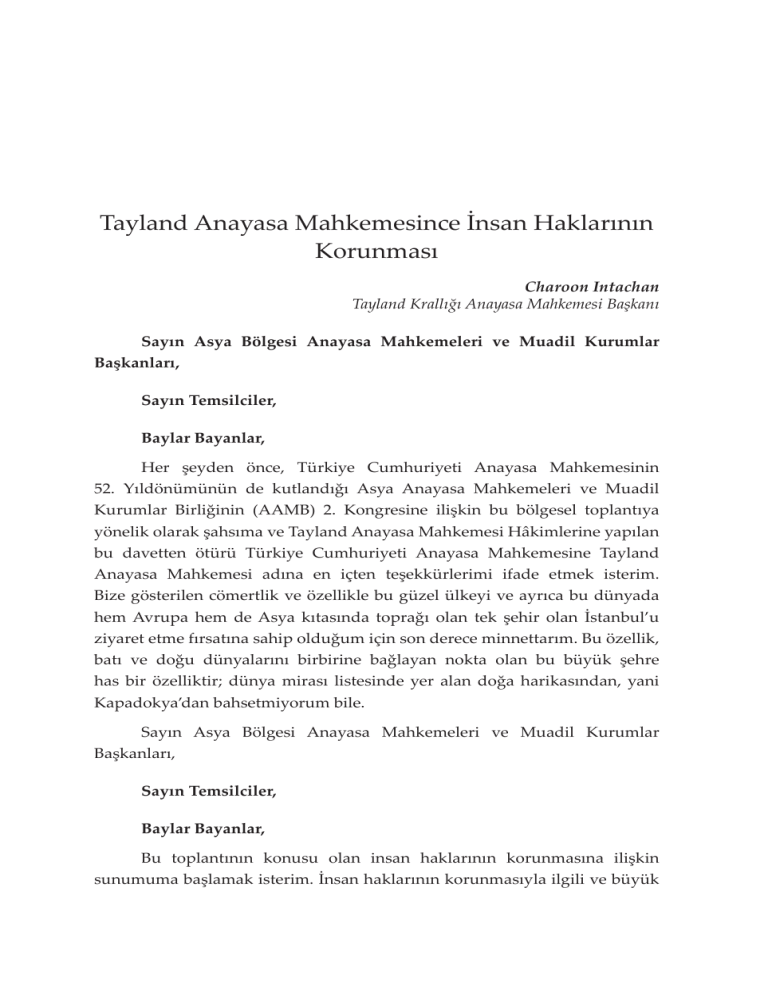
Tayland Anayasa Mahkemesince İnsan Haklarının
Korunması
Charoon Intachan
Tayland Krallığı Anayasa Mahkemesi Başkanı
Sayın Asya Bölgesi Anayasa Mahkemeleri ve Muadil Kurumlar
Başkanları,
Sayın Temsilciler,
Baylar Bayanlar,
Her şeyden önce, Türkiye Cumhuriyeti Anayasa Mahkemesinin
52. Yıldönümünün de kutlandığı Asya Anayasa Mahkemeleri ve Muadil
Kurumlar Birliğinin (AAMB) 2. Kongresine ilişkin bu bölgesel toplantıya
yönelik olarak şahsıma ve Tayland Anayasa Mahkemesi Hâkimlerine yapılan
bu davetten ötürü Türkiye Cumhuriyeti Anayasa Mahkemesine Tayland
Anayasa Mahkemesi adına en içten teşekkürlerimi ifade etmek isterim.
Bize gösterilen cömertlik ve özellikle bu güzel ülkeyi ve ayrıca bu dünyada
hem Avrupa hem de Asya kıtasında toprağı olan tek şehir olan İstanbul’u
ziyaret etme fırsatına sahip olduğum için son derece minnettarım. Bu özellik,
batı ve doğu dünyalarını birbirine bağlayan nokta olan bu büyük şehre
has bir özelliktir; dünya mirası listesinde yer alan doğa harikasından, yani
Kapadokya’dan bahsetmiyorum bile.
Sayın Asya Bölgesi Anayasa Mahkemeleri ve Muadil Kurumlar
Başkanları,
Sayın Temsilciler,
Baylar Bayanlar,
Bu toplantının konusu olan insan haklarının korunmasına ilişkin
sunumuma başlamak isterim. İnsan haklarının korunmasıyla ilgili ve büyük
142
Anayasa Yargısı 31 (2014)
önemi bulunan bir belge olan Tayland Krallığı Anayasası’na, Buddhist Era 2550
(M.S. 2007), atıfta bulunarak bunu yapmak isterim. Anayasa’nın 3. kısmında
insan haklarının korunmasını düzenleyen hükümler vardır. Anayasa, sosyal
hakların Anayasa Mahkemesince korunmasını (Başlık A) ve de hakların
insanların doğrudan eylemi ile korunmasını (Başlık B) öngörmektedir.
Geçmişte, İnsan Hakları Evrensel Bildirisi kapsamında belirtilen ilkeler de,
mevcut Anayasa dâhil, tüm taslak Tayland Anayasalarında öngörülmüştür.
Mevcut Tayland Anayasası hükümleri, İnsan Hakları Evrensel Bildirisi
kapsamında birkaç bölümde belirtilen ilkeleri yansıtır. İnsan Hakları Evrensel
Bildirisi, esasen 4 bölümden oluşur ve bu bölümler şöyledir: Bölüm 1 Temel
İlkeler, Bölüm 2 Medeni ve Siyasi Haklar, Bölüm 3 Ekonomik, Sosyal ve
Kültürel Haklar ve Bölüm 4 İnsan Haklarının Korunmasına Dair Güvencelerin
Oluşturulması ile İlgili Kişilerin, Toplumun ve Devletin Görevleri. Bildiri ile
son derece önemli bir ilke, yani bireylerin hak ve hürriyetlerinin korunması
ve bunlara saygı ilkesi ifade edilmektedir. Bu ilkeye mevcut Anayasa’da yer
verilmiştir.
Sunumumun ilk bölümünde, Anayasa Mahkemesince sağlanan sosyal
koruma meselesini Tayland Krallığı Anayasası kapsamında öngörüldüğü
üzere ele almak isterim. 1. kısımda “insanların insan onuru, hakları, hürriyetleri
ve eşitliği korunur” şeklindeki 4. madde ve “Tayland halkı, asla, cinsiyet ve dine
bakılmaksızın, bu Anayasa kapsamında eşit korumadan yararlanır” şeklindeki 5.
madde olmak üzere insan haklarının korunması ilkesine gönderme yapan
2 madde vardır. Tayland Halkının Hak ve Hürriyetleri olan 3. kısım ayrıca,
devlet erklerinin tüm kullanıcıları üzerinde bağlayıcı bir etki ve koruma
sağlar. Bu, “Açık veya zımni olarak bu Anayasa kapsamında ya da Anayasa
Mahkemesinin bir kararı ile tanınan hak ve özgürlükler korunmakta olup, kanunların
çıkarılmasında, uygulanmasında ve yorumunda, anayasal kurumlar ve devlet
daireleri dâhil olmak üzere Millet Meclisi, Bakanlar Kurulu ve mahkemeler üzerinde
doğrudan bağlayıcıdır” şeklinde ifade edilen 27. maddede görülür.
Daha sonra, Anayasa Mahkemesinin hakların sosyal anlamda
korunması hususundaki rolünü ele almak isterim. Bu, 2 biçimde görülür.
İlk olarak, Anayasa kapsamında tanınan hak ve özgürlüklere ilişkin bir ihlal
olması durumunda hukuk yoluna başvuru hakkı, “bir insan başkalarının hak
ve özgürlükleri ihlal edilmediği, Anayasa’nın çiğnenmediği, ya da halkın ahlak
ve adabına aykırı olmadığı nispette, kendi hak ve özgürlüklerini kullanabilir. Bu
Anayasa kapsamında tanınan hak ya da özgürlüğü ihlal edilen bir kimse, hukuk
Charoon Intachan Birinci Oturum
143
yoluna başvurmak üzere veya yasal işlemlerde kanıt olarak kullanmak üzere bu
Anayasa hükümlerine dayanabilir.” şeklindeki 28. madde kapsamında temin
edilir. İkincisi ise, 154. madde kapsamında yayınlanmadan önce bir kanun
teklifinin anayasal denetimi olan “soyut norm denetimi” biçiminde ve 211.
madde kapsamında öngörüldüğü üzere hali hazırda yürürlükte olan bir
kanunun anayasal denetimi olan “somut norm denetimi” biçiminde Anayasa
Mahkemesinin sağladığı sosyal korumadır. Somut norm denetimi yoluna,
hukuk yoluna başvuru hakkının kullanılması yoluyla gidilir veya bu denetim
mevcut Anayasa’nın 245. maddesi ya da 257. maddesi kapsamında Kamu
Denetçisi (Ombudsman) ya da Ulusal İnsan Hakları Komisyonu aracılığıyla bir
şikâyette bulunma hakkının kullanılması dâhil, çeşitli vasıtalarla mahkemeye
getirilen bir iddia şeklinde olur.
Ayrıca, mevcut Tayland Anayasası, 212. maddede “Bu Anayasayla
tanınan hak ya da özgürlüğü ihlal edilen bir kimse, bir kanun hükmünün Anayasaya
aykırı olduğu ya da uygun olmadığı yönünde bir hüküm verilmesi için Anayasa
Mahkemesine başvuru yapabilir” şeklindeki düzenleme ile insanların doğrudan
erişimine izin vermek suretiyle insan haklarının korunmasını tanıyan ilk
Anayasa’dır. Bu, Anayasa Mahkemesi önünde doğrudan dava açma hakkı
verilmesi olarak görülmektedir.
İnsan haklarına yönelik korumanın Anayasa Mahkemesi tarafından
geliştirilmesi yönündeki temel anayasal hüküm, Millet Meclisi, Bakanlar
Kurulu, Mahkemeler ve diğer devlet organları üzerindeki mutlak bağlayıcı
etkiyi tanıyan 216. maddedir. Buna göre, Anayasa Mahkemesi insanların temel
haklarını ve hak ve özgürlüklerini koruma etkisi olan bir hüküm verince,
böyle bir hüküm derhal geçerli olur ve bir devlet kurumu ya da kuruluşuna
karşı ileri sürülebilir.
Kadın ve erkeklerin eşit haklarını herhangi bir kanun hükmünün
ihlalinden koruma hususunda Anayasa Mahkemesinin oynadığı rolleri
yansıtan bir Anayasa Mahkemesi hükmüne ilişkin bir örnek vereceğim.
Tayland’ın genelde kadın ve erkeklerin eşitliğine ilişkin herhangi bir sorunla
karşılaşmamasına rağmen, erkeklere kıyasla kadınlara daha az hak veren
bazı kanun hükümleri halen mevcuttur. Bu, 21/2546 (2003) sayılı Anayasa
Mahkemesi Kararında görülmektedir. Önceden, Soyadı Kanunu’nun 12.
maddesi, evli bir kadının sadece eşinin soyadını kullanmasını gerektiren,
uyulması zorunlu bir hükümdü. Başvuran, böyle bir hükmün Anayasa’ya
144
Anayasa Yargısı 31 (2014)
aykırılığı iddiasını Anayasa Mahkemesi önüne getirdi. Anayasa Mahkemesi,
hükmün Anayasa’ya uygun olmadığını kabul etti ve böylelikle infaz edilemez
olduğunu açıkladı. Bu kararın kadınlara ya evlenmeden önceki soyadını
muhafaza etme ya da eşinin soyadını kabul etmeyi gönüllü olarak seçme
hakkını verme etkisi oldu. İlk kez bu hak bir Anayasa Mahkemesi kararı
ile tanındı. Millet Meclisi ardından, uygar uluslara benzer bir uygulama
olarak, evlendikten sonra kadınların unvanlarını (kullandıkları ön ekleri)
değiştirme ya da muhafaza etmelerini, yani ya “Miss.” (Evlenmemiş Bayan)
ya da “Mrs.” (Evli Bayan) unvanlarını kullanmalarını seçme hakkını tanımak
üzere kanunda değişiklik yapılmasına ilişkin bir kanun çıkardı. Anayasa
Mahkemesi kararının mevzuatta bu değişikliğe sebep olduğu inkâr edilemez.
Şu anda görev yapmakta olan Anayasa Mahkemesi hâkimlerinin
görevleri süresince ele alınan yakın geçmişteki bir diğer davada, kadın ve
erkeklerin eşitliği 17/2555 (2012) sayılı Anayasa Mahkemesi Kararında bir
kez daha yinelendi. Bu kararda, Mahkeme, Gelir Yasasının 57. maddesinin
2. fıkrasında ve 5. fıkrasındaki hükümlerin Anayasa’nın 30. maddesine
aykırı olduğuna ya da uygun olmadığına hükmetti. Daha önce, Tayland
kanunu kapsamında, uygulanabilir gelir vergi oranı tespit edilirken kadının
(eşin) değer biçilebilir gelirinin erkeğin (eşin) gelirine dâhil edilmesi ve
erkeğin (eşin) vergi beyanı vermekle yükümlü olması gerekmekteydi. Sonuç
olarak, erkek ve kadın (eşler), evlilik öncesi ayrı ayrı beyan vermesiyle
ya da evlenilmediğindeki durum ile kıyaslandığında daha yüksek vergi
yükümlülüklerine tabi olmaktaydılar. Kadınlara ve erkeklere eşit şekilde
muamele edilmediği ve evli olanlara haksız yere ayrımcılık yapıldığı açıktı.
Bu vergi hukukunun mahiyeti, belirli çiftlerin vergi yükümlülüklerini
asgariye indirmek için evliliklerini kayda geçirmesini engelledi. Bunun aile
hukukunun başarılı şekilde uygulanması üzerine bir etkisi oldu. Anayasa
Mahkemesi, kadınlar ve erkekler arasındaki eşitlik ilkesine aykırılıklar
nedeniyle ve Anayasa kapsamında belirtildiği üzere, evlilik sonrası aile
durumundaki farklılıklara dayanarak bunun (hükmün) bir kişiye karşı haksız
ayrımcılık olması nedeniyle, hükmün Anayasa’ya aykırı olduğuna veya
uygun olmadığına hükmetti. Bu kararın bir sonucu olarak, evli bir kadın şimdi
eşinden ayrı bir vergi beyannamesi verebilir. Böylece, Anayasa Mahkemesi
kararının yalnızca kadınların ve erkeklerin eşitliğini korumakla kalmayıp,
aile kurumunun güçlendirilmesi açısından da faydalı olduğu söylenebilir.
Ayrıca, 3/2552 (2009) sayılı, bir kimsenin devlet ve toplumla beraber
Charoon Intachan Birinci Oturum
145
çevrenin korunmasına katılım hakkını koruyan Anayasa Mahkemesi kararını
bir başka örnek olarak vermek isterim. Bu karar, bir kimsenin devlet ve
toplumla beraber çevrenin korunmasına katılım hakkının korunmasına
ilişkin önemli bir ilkeyi ortaya koydu. Bundan önce, ne yerel bir topluluğun
haklarına ilişkin açık bir koruma ne de bir topluluğun ortak mülkiyeti ya da
doğal kaynaklarına ilişkin bir ilke vardı.
Yukarıdaki sunumdan şunu özetle diyebilirim ki Anayasa Mahkemesinin
yalnızca anayasal hükümleri harfi harfine anlamlarını uygulamakla kalmayıp
insan hak ve özgürlüklerini koruması kadar insan haklarının güncel gelişmeler
ışığında gerçekleştirilmesini sağlamada önemli bir görevi vardır. Bu yüzden,
Anayasa Mahkemesinin insan haklarının korunmasındaki rolü, çeşitli
ülkelerde insan haklarının korunması ve hukukun üstünlüğü kapsamında
demokrasinin güçlendirilmesi açısından önemlidir. Tayland Krallığı Anayasa
Mahkemesi, “hukukun üstünlüğüne bağlılık, demokrasinin savunulması, insanların
hak ve özgürlükleri için saygı” şeklindeki ilkesinde (motto) ifade edildiği üzere,
bu gayeye bağlı kalıp, bu gayenin önemini tam anlamıyla kavramaktadır.
Kaldı ki Anayasa Mahkemesi evrensel toplumun bir parçası olduğunu ve
bu nedenle küresel eğilimlerle uyumlu olmak zorunda olduğunu kabul
eder. Anayasa Mahkemesi, Asya Anayasa Mahkemeleri ve Muadil Kurumlar
Birliğinin de bir üyesidir ve bu sebeple, bu Kongre’ye katılma fırsatı bulmuştur.
Tayland Anayasa Mahkemesi, evrensel düzeyde eşdeğerleriyle birlikte aynı
seviyede yer almak için bu oturumlarda edinilen bilgileri zamana uymayan
alanların modernleştirilmesi amacıyla alçakgönüllülükle uygulayacaktır.
Tayland Anayasa Mahkemesi, hem Tayland halkının hem de insanların temel
haklarının korunmasına ilişkin kolektif çalışmadaki rolünü inkâr edemez.
Son olarak, beni dinlediğiniz için size bir kez daha teşekkür etmek
isterim. Teşekkür ederim.
The Protection of Human Rights by the Thai
Constitutional Court
Charoon Intachan
President of the Constitutional Court of the Kingdom of Thailand
Presidents of Constitutional Courts and Heads of Equivalent
Institutions of
The Asian Region,
Honorable Delegates,
Ladies and Gentlemen
Before all else, on behalf of the Constitutional Court of Thailand, I would
like to express my sincerest gratitude to the Constitutional Court of Turkey for
extending to myself and Justices of the Constitutional Court of Thailand invitations
to attend this regional meeting of the 2nd Congress of the Association of Asian
Constitutional Courts and Equivalent Institutions (AACCEI), which also marks the
52nd Anniversary of the Constitutional Court of the Republic of Turkey. I am deeply
appreciative of the generosity bestowed upon us, and in particular, the opportunity
to visit this beautiful country of the Republic of Turkey as well as the Metropolis of
Istanbul, the only city in this world which sits across both the continents of Europe
and Asia. This quality is exclusive to the metropolis which forms the connecting
point between the western and eastern worlds – not to mention the natural wonder
which has been listed as a world heritage, namely the Cappadocia.
Presidents of Constitutional Courts and Heads of Equivalent
Institutions ofthe Asian Region,
Honorable Delegates,
Ladies and Gentlemen
148
Anayasa Yargısı 31 (2014)
I would like to begin with a presentation on the topic of this meeting,
that is, the protection of human rights. I intend to do so by referring to the
Constitution of the Kingdom of Thailand Buddhist Era 2550 (A.D. 2007), a
document of great significance and relevance to the protection of human
rights. There are provisions in 3 Chapters of the Constitution which deal
with the protection of human rights. The Constitution provides for the
social protection of rights by the Constitutional Court (Heading A) and the
protection of human rights by direction action of the people (Heading B).
In the past, the principles stated under the Universal Declaration of Human
Rights have also been provided in all Draft Thai Constitutions, including the
current Constitution. The provisions of the current Thai Constitution reflect
principles provided under the Universal Declaration of Human Rights in
several sections. The Universal Declaration of Human Rights is essentially
comprised of 4 parts, namely, Part 1 Essential Principles, Part 2 Civil and
Political Rights, Part 3 Economic, Social and Cultural Rights and Part 4 Duties
of Persons, Society and the State in regard to the creation of security for the
protection of rights. The Declaration states one important principle which is
of utmost significance, that is, the respect and protection of rights and liberties
of individuals. This principle is enshrined in the current Constitution.
For the first part of my presentation, I would like to address the
issue of social protection by the Constitutional Court as provided under the
Constitution of the Kingdom of Thailand. There are 2 sections in Chapter 1
which refers to the principle of human rights protection, i.e. section 4, “human
dignity, rights, liberties and equality of persons are protected,” and section 5,
“the Thai people, regardless of origin, sex or religion, enjoy equal protection under
this Constitution.” Chapter 3, Rights and Liberties of the Thai People, also
provides protection and binding effect on all exercisers of state powers. This
is found in section 27 which states that “rights and liberties recognized under
this Constitution, expressly or impliedly or by ruling of the Constitutional Court
are protected and directly binding on the National Assembly, Council of Ministers,
Courts, including constitutional organs and state agencies in the enactment of laws,
enforcement of laws and interpretation of laws.”
Next, I would like to discuss the Constitutional Court’s role in the social
protection of rights. This is found in 2 parts. Firstly, the right to seek judicial
relief in the event of a violation of rights and liberties recognized under the
Constitution is provided under section 28, “a person may invoke human dignity
Charoon Intachan Birinci Oturum
149
or exercise one’s rights and liberties to the extent that the rights and liberties of
others are not violated, that the Constitution is not defied, or that is not inconsistent
with the good morals of the people. A person whose right or liberty recognized under
this Constitution is violated may rely on the provisions of this Constitution to seek
judicial relief or to invoke as an argument in judicial proceedings.” The second part
is social protection by the Constitutional Court provided under section 154 in
the form of an “abstract norm control” constitutional review of a bill of law prior to
promulgation, and protection in the form of a “concrete norm control” constitutional
review of a law that is already in force as provided under section 211. The
latter is invoked by the exercise of the right to seek judicial relief or relied as
an argument in court through various agencies, including the exercise of the
right to file a complaint through the Ombudsman or National Human Rights
Commission under section 245 or section 257 of the current Constitution.
Furthermore, the current Thai Constitution is the first Constitution to
recognize the protection of human rights by way of allowing a direct action
by the people as provided under section 212, “a person whose right or liberty
recognized by this Constitution is violated may file an application in the Constitutional
Court for a ruling that a provision of law is contrary to or inconsistent with the
Constitution.” This is deemed as a grant of a direct right to file an action in the
Constitutional Court.
The key constitutional provision for the promotion of human rights
protection by the Constitutional Court is section 216 which recognizes the
absolute binding effect on the National Assembly, Council of Ministers,
Courts and other state organs. The means that once the Constitutional Court
has made a ruling which has the effect of protecting human rights and the
rights and liberties of the people, such a ruling would have immediate effect
and can be raised against a state organ or agency.
I shall illustrate by giving an example of a Constitutional Court ruling
which reflects the roles of the Constitutional Court in protecting the equal
rights of men and women from any undue violation by any provision of
law. Even though Thailand does not usually encounter any problem on the
equality of men and women, there were still some provisions of law which
conferred lesser rights on women when compared to men. This was to be
found in Constitutional Court Ruling No. 21/2546 (2003). Previously, section
12 of the Surnames Act was a mandatory provision which required a married
150
Anayasa Yargısı 31 (2014)
woman to use only her husband’s surname. The applicant sought to challenge
the constitutionality of such a provision in the Constitutional Court. The
Constitutional Court held that the provision was contrary to or inconsistent
with the Constitution and therefore rendered unenforceable. This ruling had
the effect of giving women the right to voluntarily choose to either retain her
maiden name or adopt her husband’s surname. This was the first time the
right was recognized by a ruling of the Constitutional Court. The National
Assembly subsequently enacted an amending law to recognize the right of
women to choose whether to change or retain their prefixes, i.e. use of either
“Miss” or “Mrs.”, after marriage, a practice similar to civilized nations. It
cannot be denied that this change in legislation was brought about by the
Constitutional Court ruling.
In another recent case, during the term of the currently serving
Constitutional Court Justices, the equality of men and women was once
again reiterated in Constitutional Court Ruling No. 17/2555 (2012). In this
ruling, the Court held that the provisions of section 57 bis and section 57
quinque of the Revenue Code was contrary to or inconsistent with section
30 of the Constitution. Previously under Thai law, it was required that
the assessable income of the wife should be included in the husband’s
income when determining the applicable income tax rate, and that the
husband was under a duty to file a tax return. As a consequence, the
husband and wife was subject to higher tax liabilities when compared to
the case of separate filings prior to marriage, or even in the case of nonmarriage. It was apparent that men and women were not treated equally,
and those who were married were unjustly discriminated. The nature of
this tax law deterred certain couples from registering their marriages in
order to minimize their tax liabilities. This had an impact on the successful
application of family law. The Constitutional Court held that the provision
was contrary to or inconsistent with the Constitution due to inconsistencies
with the principle of equality between men and women, and due to its
being an unjust discrimination against a person on the basis of differences
in personal status after marriage, as stated under the Constitution. As a
consequence of this ruling, a married woman can now file a separate tax
return from her spouse. It is therefore perceivable that the Constitutional
Court ruling not only protected the equality of men and women, but was
also beneficial to the strengthening of the family institution.
Charoon Intachan Birinci Oturum
151
Furthermore, I would like to illustrate by another example of a
Constitutional Court ruling which protected the rights of a person to participate
with the state and community in the conservation of the environment, i.e.
Constitutional Court Ruling 3/2552 (2009). This ruling laid down the important
principle on the protection of a person’s right to participate with the state and
the community in the conservation of the environment. Before this, there was
neither any clear protection on the rights of a local community nor a principle
on a community’s common property or natural resources.
From the foregoing presentation, I may summarize that the protection
of the people’s rights and liberties is regarded as an important task of the
Constitutional Court in ensuring the actual realization of human rights, and
not just by recognition of the black letters of the constitutional provisions.
The Constitutional Court’s roles in human rights projection is therefore
essential to the strengthening of democracy under the rule of law and the
protection of human rights in various countries. The Constitutional Court of
the Kingdom of Thailand fully appreciates the significance of and remains
committed to this cause, as stated in the motto of the Constitutional Court
of the Kingdom of Thailand, “commitment to the rule of law, upholding
democracy, concern for the rights and liberties of the people.” Moreover,
the Constitutional Court recognizes that it is a part of the global community
and must therefore accommodate the globalization trend. The Constitutional
Court is also a member of the Association of Asian Constitutional Courts
and Equivalent Institutions, and by virtue thereof, has had the opportunity
to attend this Congress. The Constitutional Court of Thailand will humbly
adopt the knowledge acquired during these sessions to the modernization of
outdated areas in order to stand alongside others on an equal footing in the
global community. The Constitutional Court of Thailand cannot deny its part
in the collective task on the protection of human rights of both the Thai people
and humanity.
Lastly, I would like to once again thank you all for your attention.
Thank you

